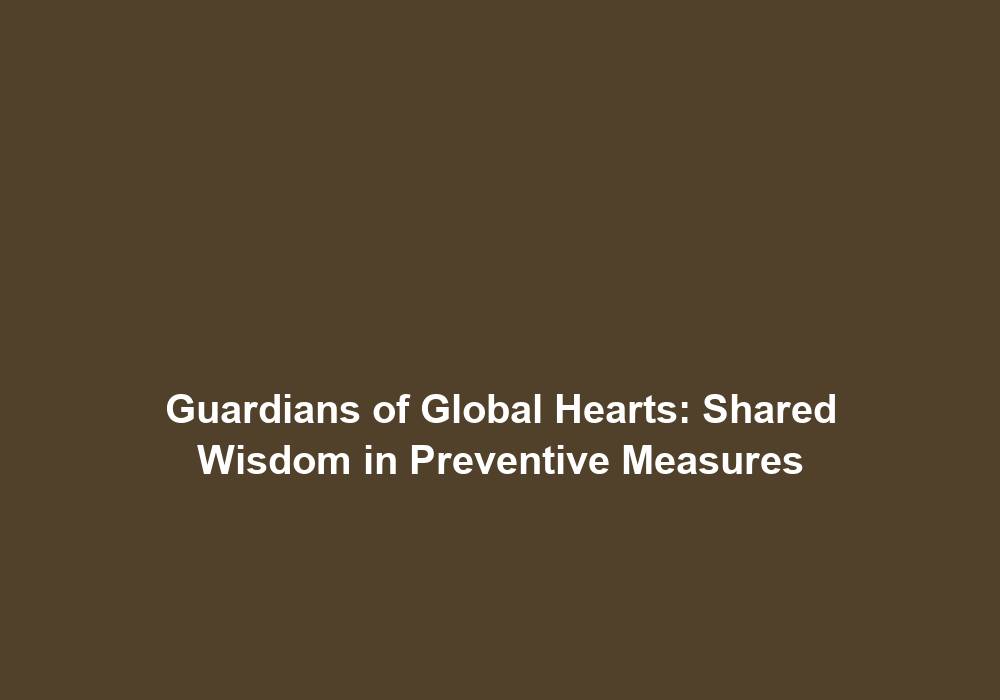Guardians of Global Hearts: Shared Wisdom in Preventive Measures
The world is currently facing numerous challenges, with global health crises posing a significant threat. As our world becomes more interconnected, the need for preventive measures to safeguard our collective well-being has never been more critical. In this article, we will delve into the concept of Guardians of Global Hearts and the pivotal role of shared wisdom in implementing effective preventive measures.
The Rise of Global Health Crises
In recent years, the global community has witnessed the rapid and widespread transmission of infectious diseases, most notably exemplified by the COVID-19 pandemic. These outbreaks have not only exposed the vulnerability of our interconnected world but have also underscored the urgent requirement for preventive measures. The implications of such crises extend beyond the health sector, permeating into economies, social structures, and the overall stability of nations.
The Role of Guardians of Global Hearts
The term “Guardians of Global Hearts” embodies the collective efforts of individuals, organizations, and governments working collaboratively to safeguard the well-being of people worldwide. These guardians act as gatekeepers, playing a pivotal role in implementing and promoting preventive measures that ensure the safety and health of communities.
Shared Wisdom: A Key to Effective Preventive Measures
Shared wisdom serves as an indispensable catalyst for the successful implementation of preventive measures. By combining knowledge, best practices, and experiences from various sources, we can develop robust strategies to combat global health crises. Let’s explore some specific ways in which shared wisdom can be harnessed:
1. Collaboration and Communication
Effective preventive measures necessitate seamless collaboration and open communication among various stakeholders, including governments, healthcare professionals, scientists, and communities. By fostering a culture of dialogue and information sharing, we can collectively develop comprehensive strategies to address health challenges. Some key aspects to consider include:
- Establishing platforms for continuous engagement and knowledge exchange.
- Encouraging interdisciplinary collaboration to harness diverse expertise.
- Facilitating information dissemination through reliable communication channels.
2. Global Surveillance and Early Warning Systems
The establishment of robust global surveillance systems and early warning mechanisms is paramount in preventing the rapid spread of infectious diseases. By sharing real-time data and information on outbreaks, countries can take immediate preventive actions, effectively minimizing the impact on public health. Key considerations in this domain include:
- Developing standardized protocols for data collection, analysis, and sharing.
- Enhancing cooperation between nations to ensure comprehensive surveillance coverage.
- Investing in technological advancements to strengthen early warning systems.
3. Research and Development
Investing in research and development is pivotal for staying ahead of emerging health threats. By sharing research findings, innovative solutions, and technological advancements, we can develop effective preventive measures, diagnostics, and treatments. Some areas of focus include:
- Collaborative research initiatives to accelerate knowledge generation.
- Promoting open-access publishing and sharing of research outcomes.
- Encouraging public-private partnerships to foster innovation.
4. Capacity Building and Training
Building the capacity of healthcare professionals, first responders, and community leaders is vital in implementing effective preventive measures. By sharing knowledge, expertise, and training programs, we can empower individuals and communities to proactively respond to health crises. Considerations for capacity building include:
- Designing comprehensive training programs tailored to specific roles and responsibilities.
- Facilitating knowledge transfer through mentorship and peer-to-peer learning.
- Supporting the development of specialized skills and competencies.
5. Public Awareness and Education
Public awareness and education campaigns play a pivotal role in promoting preventive measures. By sharing accurate and timely information, raising awareness about health risks, and educating communities on preventive actions, we can empower individuals to protect themselves and others. Key components to consider include:
- Developing targeted educational materials to address specific population needs.
- Leveraging diverse communication channels to reach a wide audience.
- Collaborating with community leaders and influencers to amplify messaging.
Preventive Measures: A Holistic Approach
To effectively protect global health, preventive measures must adopt a comprehensive and holistic approach. Let’s explore some key components that should be considered:
1. Vaccination Programs
Vaccination stands as one of the most powerful preventive measures against infectious diseases. Ensuring affordable and accessible vaccines enables governments to protect their populations and contribute to global health security. Key considerations in vaccination programs include:
- Developing immunization schedules and guidelines based on global best practices.
- Strengthening vaccine supply chains to ensure equitable distribution.
- Conducting robust monitoring and evaluation to assess vaccine efficacy.
2. Hygiene and Sanitation
Promoting good hygiene practices, such as handwashing, and improving sanitation infrastructure are crucial in preventing the spread of diseases. Access to clean water and proper sanitation facilities should be prioritized, especially in vulnerable communities. Key aspects of hygiene and sanitation measures include:
- Implementing behavior change campaigns to foster hygienic practices.
- Investing in infrastructure development for water and sanitation facilities.
- Ensuring equitable access to basic sanitation services for all communities.
3. Health Systems Strengthening
Investing in robust healthcare systems is essential for effective preventive measures. This includes increasing healthcare access, enhancing surveillance capabilities, and improving healthcare infrastructure to respond swiftly to health threats. Key considerations for health systems strengthening include:
- Expanding healthcare infrastructure to ensure adequate capacity during crises.
- Strengthening disease surveillance and reporting mechanisms.
- Prioritizing healthcare workforce development and retention.
4. Border Control and Travel Restrictions
During global health crises, implementing appropriate border control measures and travel restrictions can help contain the spread of diseases. Collaborative efforts between countries are vital in developing standardized protocols to ensure effective preventive actions. Key considerations for border control and travel restrictions include:
- Establishing coordinated mechanisms for information sharing between countries.
- Implementing screening procedures at border checkpoints based on international guidelines.
- Collaborating on the development of travel advisories and risk assessment frameworks.
5. Psychological and Mental Health Support
Addressing the psychological and mental health impacts of global health crises is crucial. By providing adequate support and resources, including mental health services, we can help individuals and communities cope with the emotional toll of such challenges. Key aspects of psychological and mental health support include:
- Integrating mental health services into healthcare systems and emergency response plans.
- Establishing helplines and support groups to provide emotional support.
- Conducting awareness campaigns to reduce stigma associated with mental health.
In conclusion, the concept of Guardians of Global Hearts emphasizes the importance of shared wisdom in implementing effective preventive measures. By collaborating, communicating, and pooling resources, we can create a safer and healthier world. It is through this collective effort that we can effectively protect our global community from the threats of global health crises. Let us stand together as guardians of global hearts and work tirelessly towards a better future.







